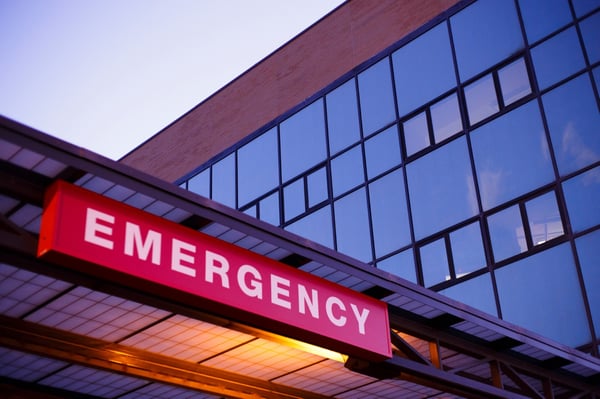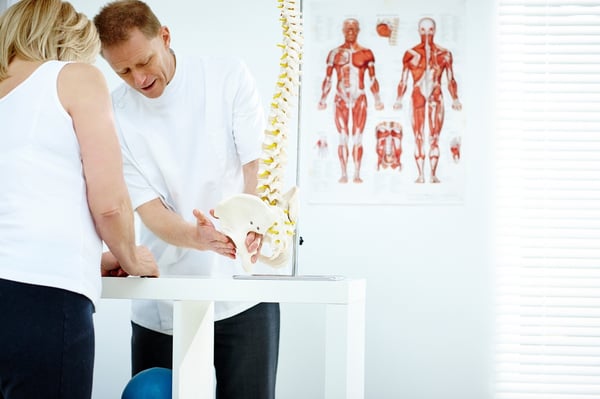Back pain usually goes away on its own.
More often than not, back pain is benign and a result of working out, sleeping poorly, sitting in a terrible chair or poor posture.
You'll deal with some discomfort for a little while, but it will eventually go away in time.
Most back pain incidents go away within 6 weeks.
However, some symptoms of back pain might lead you to think you need to see a doctor.
And, although rare, you might even end up in the emergency room.
If you're ever in doubt about the severity of your back pain and whether or not it warrants medical attention, you should give your primary care doctor a call.
In the article below, we will discuss six signs it's time to see a doctor for your back pain.
Were you recently injured in a car accident? Read our blog post: "What are the Most Dangerous Types of Car Accidents."
Table Of Contents
- The Pain Keeps You Up At Night
- The Pain Is The Result Of An Accident
- You've Had Cancer
- You Experience Numbness And Tingling
- You're Over 50
- Your Pain Radiates Down One Arm Or Leg
- BONUS: See A Chiropractor To Prevent Back Pain

1. The Pain Keeps You Up At Night
Back pain that keeps you up at night, or gets worse when you rest, is generally nothing to be too worried about.
However, it's in your best interest to get it checked out, especially if it's accompanied by a fever.
Back or neck pain that's accompanied by a fever could be a sign of an infection such as meningitis.
Infections like that can get serious very fast, so don't wait to call your doctor.
Prompt diagnosis and treatment could make the difference between life and death.
2. Your Pain Is The Result Of An Accident
If your back pain is the direct result of any type of accident, you need to go to the hospital or see a car accident injury doctor to be sure you haven't suffered a serious injury.
Even if you think you're fine, and you feel fine in the moment, it's still important to get checked out by a doctor.
Sometimes serious symptoms can lay dormant for days, and it is best to get them diagnosed as soon as possible.
Research has also shown that back pain can be a symptom of an injury to another part of your body like your abdomen or lungs. Your doctor will know the difference.
For more information on common car accident injuries, read our blog post: "What are the Most Common Car Accident Injuries?"
3. You've Had Cancer
Hopefully this one doesn't apply to you, but a history of cancer combined with first time back pain could be a warning sign for colon, rectum, or ovary cancer.
According to the American Cancer Society, growing cancer can put pressure on organs, nerves, or blood vessels.
That pressure can cause back pain.
By the time you notice the back pain, the tumor is typically very large, making it imperative that you see your doctor as soon as possible.
The general consensus is that once you notice the pain, cancer has already begun to spread.
Seek medical attention as soon as you can.

4. You Experience Numbness And Tingling
Your fingers and toes can tingle as a result of the cold, but that's not the tingling we're talking about here.
If you're suffering from back pain, especially if it's near the spine, and it's accompanied by numbness and tingling in your legs, it can be a sign of nerve damage.
You should visit your doctor as soon as possible to eliminate this possibility or begin treatment to fix it.
5. You're Over 50
Our potential for back pain will increase as we age.
Aging is also often accompanied by a more sedentary lifestyle which can contribute to obesity, which is associated with an increased risk for back pain.
If you're over 50 with back pain, your doctor might be able to work with you on a plan to control your pain using a combination of physical therapy, exercise, chiropractic care, weight management, and other relevant treatments.
6. Your Pain Radiates Down One Arm Or Leg
Pain, weakness, numbness or electrical sensations that go down one leg is often sciatica.
Although sciatica symptoms may result from a tight piriformis muscle, these symptoms are more often due to pressure on a spinal nerve root.
Symptoms that result from pressure on a spinal nerve root are called radiculopathy.
To diagnose your sciatica, your doctor will try to elicit your symptoms by testing your dermatomes.
Dermatomes are areas of skin that are served by spinal nerve roots.
This testing will help your doctor identify the exact spinal nerve root or roots that are irritated. In turn, this could help make your treatment choice as accurate as possible.
Radiculopathy is often caused by a herniated disc, but not always.
It can also be caused by bone spurs that press on spinal nerve roots.

BONUS: See A Chiropractor To Prevent Back Pain
Visiting a chiropractor can keep benign back pain from becoming a problem.
During your first visit to the chiropractor, your chiropractor will get your medical history, perform a complete physical exam, and could order lab tests or imaging services if necessary.
Based on the information gained from your first visit, your chiropractor will then develop a treatment plan tailored to your needs.
The plan could involve one or more manual adjustments where the chiropractor manipulates your joints using a controlled, sudden force to improve range and quality of motion.
Many chiropractors also incorporate nutritional counseling, exercise/rehabilitation, and improved lifestyle choices in their treatment plans.
The goals of chiropractic care is to restore the function of your body's nervous system allowing your body to function at an optimal level.
This relieves patients of back pain, prevents it from recurring, and improves their overall health and well being.
If you'd like to see a chiropractor for your back pain, contact the team at Car Wreck Doctor.
They will pair you with a chiropractor that will make your back pain a thing of the past.
Click the button below to get started today.

